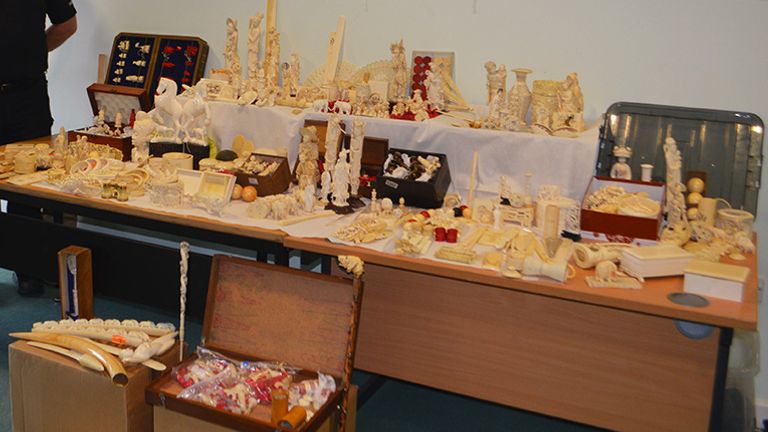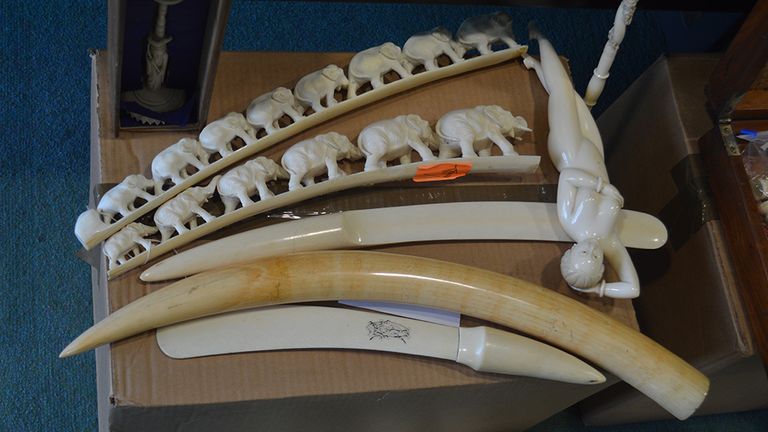More than £60,000 seized from man who traded in illegal ivory | UK News


[ad_1]
More than £60,000 has been seized from a man who traded in illegal ivory.
Ngie Law, of Derby, was convicted in August 2021 of 18 different counts of buying, selling, and possessing the ivory goods without a permit.
Now, following a hearing at Derby Crown Court last week, he is subject to a confiscation order that will see him lose £61,266.97 in cash or assets.
The seized ivory will be distributed to other forces, the National Wildlife Crime unit trainer, Border Force CITES Team, and the Museum of Scotland for training purposes.
Any left over will be destroyed to prevent it returning back into the trade.
Officers first began investigating Law after they intercepted a package from China in 2016 which contained ivory.
A search warrant was then carried out at the 45-year-old’s address, where officers discovered a large number of ivory goods, including unworked tusks cut from endangered animals, cutlery, and ornamentals including billiard balls, figurines, and a cigarette holder.
It is believed the ivory was mostly from elephants that had been killed by poachers between 1970 and 1990 and he had made around £65,000 through an online selling site.
Law pleaded guilty and was given a two-year sentence, suspended for two years.
PC Emerson Buckingham said: “No one should profit from criminal activity, and it is perhaps particularly distressing to think how much money was handed over as a result of the suffering of animals.
“It’s surprising to think that crimes involving endangered species have taken place in Derby, and this should be a warning that anyone involved in such activity that not only may they face a sentence, but they can also be ordered to forfeit any so-called ill-gotten gains.”
The confiscation order has been brought under the Proceeds of Crime Act (or POCA) which allows the police to apply for cash to be seized from criminals who have made their money through criminality.
It is typically used after sentence and can see criminals forced to sell properties, cars, or jewellery that belongs to them to pay off their debt.
Any money seized is split between the police and the government, and is often used to fund community projects.
Chief Inspector Kevin Kelly, head of the National Wildlife Crime Unit said: “The illegal wildlife trade is a global issue, and this is an example of an international case with reach ending on the streets of the UK.
“Criminals exploit our animals for their own selfish gain with little to no regard for their welfare, inflicting the worst types of cruelty to maximise monetary gain.
“Legislation relating to wildlife crime is often complex so it’s refreshing to see that wildlife criminals are now being punished financially, this is a small step towards justice for exploited animals.”
[ad_2]
Recent Posts
What is the SCAR gun in Call of Duty? – Spaxton School
The SCAR-H is an assault rifle featured in Call of Duty: Modern Warfare 2, Call…
Is Warhammer Quest 2 multiplayer? – Spaxton School
Over the past two years, Warhammer Quest: Silver Tower has been an enjoyable single-player experience.…
Is the Mario mushroom edible? – Spaxton School
A very important note though, these mushrooms are poisonous so don’t eat them. Though they…
What is the latest version of eFootball? – Spaxton School
We would like to inform you that the v1. 0.0 update for eFootball™ 2022 (available…
What are the different light colors in PS4? – Spaxton School
When you press the PS button, the light bar will glow in a uniquely assigned…
Is it possible to miss Garrus? – Spaxton School
Garrus is easy to miss in the original Mass Effect. Shepard can recruit him after…

